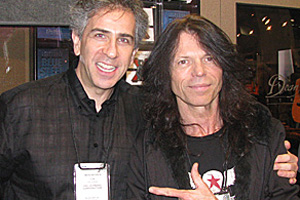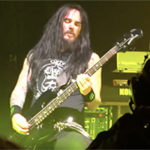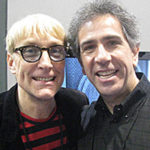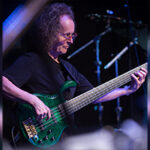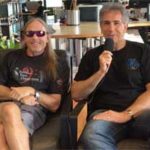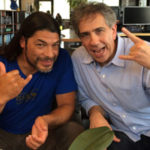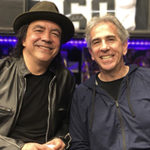Seasoned rocker tells FBPO about his early years in Cuba, plus experiences with Jaco, Ozzy, Randy Rhoads, and Dio
Exclusive interview with FBPO’s Jon Liebman
April 2, 2012
Rudy Sarzo has played bass for some of the best-known rock and heavy metal acts in the music industry, including Ozzy Osbourne, Quiet Riot, Whitesnake, Blue Öyster Cult, Yngwie Malmsteen, Dio and others. Rudy’s recordings with these artists and others have sold in excess of thirty million copies.
FBPO: I’ve always been intrigued by your earliest years in your native Cuba. Tell me about your musical upbringing and your earliest musical influences?
RS: I’ll tell you exactly because it’s always stayed with me. As a matter of fact, it’s something that I am on a journey right now to get in touch with it again because it never left me. I feel it’s been a part of everything that I am. I was ten and-a-half, almost 11 years old when I left Cuba, so the time I spent there made up my formative years.
I would say my earliest musical influences were the kids in the neighborhood, down on the corner from where I lived in Havana. They used to gather every single night around some ’50s DeSoto or some Dodge or Chevrolet, whatever. And they would stand there and just start playing rhythm, “Poom-tacca-tacca-tacca, poom-tacca-tacca-toom,” you know, like around the car, on the hub cap or the fender. In those days, all the cars were made out of metal [laughs], so there were plenty of places to start beating. And so there would be like ten, twenty kids around that same car, just playing percussion. I would say to you my earliest musical influence was actually Afro-Cuban percussion, most of the time the sound coming out of the car.
And now, every time I hear someone like Arturo Sandoval playing the horn, it kind of takes me back to those early days in Havana, where my parents used to take my brother and me to what they called verbenas, which were kind of like outdoor dance events. We would see people like Benny Moré, Celia Cruz, Rolando Laserie, that type of music, before it was called salsa [laughs], which is what I consider Cuban music, you know Afro-Cuban music.
We also had some rock in español, kind of like Elvis impersonators, or, you know, latin rockers. As soon as Castro came in, which was like around ’59, any sort of American type of music was basically illegal. As a matter of fact, even the saxophone and American jazz was pretty much an illegal form of music in Cuba after the revolution.
It wasn’t until 1961 when I got to the U.S. that I rekindled my love for R&B and rock in general. By the time I got here, though, Little Richard was a minister and Chuck Berry was in jail and Jerry Lee Lewis got in trouble, so rock & roll was, pretty much dominated by the “safe” performers, such as Pat Boone or Frankie Avalon or even the Platters. It wasn’t until the British Invasion that I really got heavily back into rock. To me, rock & roll just epitomizes the freedom of expression, which is something we didn’t have in Cuba when I left, so it really means a lot to me to play rock.
FBPO: How did you become a bass player?
RS: Well, I was the only guy in the neighborhood that got tapped into it! [Laughs] Nobody wanted to play bass. It was either drummers or guitar players. Somebody explained to me that playing a bass line was kind of like doing a solo during the whole song, so I said, “I like that!” It wasn’t until later on that I got into the whole concept of being part of the rhythm section and listening to the drums and being really tight and stuff like that.
As a kid, especially in the old days, you didn’t have YouTube, you didn’t have all the masters available, playing online, to teach you and share their knowledge with you. Back in the day, it was kind of like the kid who knew the most in the neighborhood, that’s the guy that you turned to, which, in comparison to the knowledge you can actually gather from YouTube, it was nothing, nothing at all. It took me a couple of years to find somebody who would actually be kind enough to teach me how to properly tune the guitar, or the bass.
First, I started playing bass on an old Craftsman six-string because that was the first instrument that we got from Sears, you know, one of those mail-order catalogue things. It wasn’t until maybe three or four years later that I got my first bass, which was a Zingar bass. I don’t even know where it came from. It wasn’t until I got my Gibson EB American-made instrument that things started to really click in for me.
Today I work with manufacturers, such as Peavey Electronics, and I have my own signature bass. Something that I always discuss with them is the importance of getting in the hands of beginners a really good quality instrument that is inspirational to play. I do these events called Rock & Roll Fantasy Camps and a lot of the young students come in with these really awful instruments. And I go, “How can you get inspired to play on this thing? I can’t even play it myself! So I don’t expect you to spend hours enjoying this.”
FBPO: Where did you settle when you came to America? How did you get immersed in the music business?
RS: The music business wasn’t until later. When I got into playing, it was a calling. It was something that I really wanted to do. It wasn’t because of the money or anything like that. I didn’t even know that a business existed. All I knew was I’m going to play the instrument, I’m going to get in a band and I’m going to make music.
I have to be honest with you, the first impression I got when I watched the Beatles on Ed Sullivan was, “I want to do this because girls dig it!” [Laughs] And then after a while, you got to really understand what you were doing with the instrument, which is communicating. You’re using music as the language to express yourself. But of course that didn’t come until later on.
I grew up in Miami during my first three years in the U.S., from ’61 to ’63. By late ’63, right before Kennedy was assassinated, we moved to New Jersey. And then after New Jersey, we came back to Miami in around ’67. There were always plenty of gigs around town.
As a matter of fact, I grew up playing basically the same circuit as Will Lee, from the David Letterman orchestra. His father was the dean of the music school at the University of Miami and, as a matter of fact, Jaco was a teacher there. I used to go watch Jaco playing around town. He used to play with this quintet, the Ira Sullivan Quintet.
FBPO: I used to play with Ira! I lived in Miami for six years.
RS: Oh, you did? I didn’t know that! You gotta tell me this stuff! You remember the Lion’s Share, which was on the University of Miami campus? It was kind of like a sub shop, where they made submarine sandwiches and stuff like that. Ira used to play there with Jaco. And when I used to watch Jaco, I thought, “Oh my God, there’s got to be a thousand guys as good as this guy!” [Laughs] That was inspiring and scary at the same time.
FBPO: Were Pat Metheny and Mark Egan and Danny Gottlieb and all those guys down there when you were there?
RS: Yeah. Mark Egan went to University of Miami. So did Steve Bailey. I also wound up playing clubs like the Newport and the Castaway in North Miami Beach and all that stuff. That was my training ground. And then, after disco came in, because I was mostly playing rock, we gravitated toward Fort Lauderdale and all the clubs up there. Who did you play with in Miami?
FBPO: Well, I did a whole lot of the latin stuff. I played with Julio Iglesias and Jose Feliciano. I used to tour with a guy named Braulio, from the Canary Islands, and a young singer from Puerto Rico named Chayanne. I also performed and/or toured with Libertad Lamarque, Nelson Ned, Angela Carrasco, Miguel Gallardo and a whole bunch of other latin stars. I did all kinds of rock and jazz stuff, too, and tons of theater shows.
RS: So we’ve got a lot of people in common. Excellent!
FBPO: Jumping ahead a bit, how did the Ozzy gig come about?
RS: Well I wrote a book about it, Off the Rails. But just to give you the condensed version of the story, before Ozzy, I was playing in a group called Quiet Riot, with Randy Rhoads, in the late ’70s. Randy went off to join Ozzy and they were looking for a replacement for Bob Daisley and Lee Kerslake. They got Tommy Aldridge on drums and they were looking for a bass player, so Randy recommended me. Basically, on his recommendation, all I had to do was know how to play the songs and I got the gig.
FBPO: Tell me something about Ozzy. Is he a misunderstood individual, or is he pretty much what-you-see-is-what-you-get?
RS: Well, a bit of both. I mean, yes, there’s really a misunderstanding about Ozzy. I got to live with the guy. Not only him, but with also Sharon. When I was on the road, we were all in the same bus and the same hotel – not the same hotel room, but the same hotel. When we were off the road, I lived with them, up in Sharon’s father’s estate, up in the Canyon in Beverly Hills. And so I got to spend a lot of time with them.
Things are very different today. Back in the ’60s and ’70s, touring was very harsh. We didn’t have the productive capabilities that we have nowadays, with all the technology, like laptops and iPads and whatever. Back in the day was basically, you go to the bar. [Laughs] You hang out at the bar. That was your social networking. That was your Facebook, the bar at the Holiday Inn. And that’s where you met the fans. They knew that you were going to be staying there. Of course your tour bus was parked outside. They’d come in and they’d meet you and you’d hang out and whatever, you know. So there was a lot of drinking going on, a lot of killing time between shows, and so on.
So yeah, Ozzy and everybody else of that generation were part of a big misunderstanding. Fortunately, he had people around him, like Sharon, that kept him from becoming a rock casualty, rather than the rock star that he is today. It could have happened. He could have gone off the deep end with drugs and alcohol, but within every day was definitely an intervention, until recently. He’s been sober and clear for a few years now. So yeah, he’s misunderstood. He’s pretty much a product of the environment and of its time. Ozzy is also incredibly astute. He’s always been amazing at recognizing great talent. So many incredible musicians have gone through his band, from Randy Rhoads and Zakk Wylde to Robert Trujillo and Mike Inez and, you know, people like that. He’s got a great talent for discovering great talent.
FBPO: Why inspired you to write Off the Rails? Were you trying to clear up any misconceptions?
RS: No, I open up Chapter 2 explaining why I wrote it. I wanted to answer the number one question I get asked when I travel around the world, which is: What was it like to play with Randy Rhoads? And every time I would sit down and spend 5-10 minutes with a fan, I always walked away feeling like I didn’t say enough. I forgot to tell him about this or that or whatever other story. So I had to put it down in approximately 300 pages. It’s all there.
FBPO: I know you and Randy were very close. How would you like him to be remembered? What would you like people to say about him?
RS: Oh, very simple. When I met Randy, not only was he the guitar player for Quiet Riot, but he was also a teacher. Randy had this great ability to share knowledge, with me and with others. If you look at a photo of Randy playing onstage, the way he holds the guitar, he’s showing the first twenty rows what he’s actually playing. He’s not one of those guys who’s going to hide his technique. He was very clear in his playing, very clear in his expressions, what he wanted to say, musically, using the guitar as an instrument of communication. There was a lot of clarity in his playing, the way he picked each note, with a lot of clarity. And it really was a reflection of his personality because you always knew where you stood with Randy. When he had something to say, he phrased it very clearly. And he did that with his music also.
FBPO: Jumping ahead to Whitesnake, you were with that band for quite a while.
RS: Yeah, from ’87 to ’94. ’94 was my last tour with the band.
FBPO: That band seems to go through a lot of bass players. Why do you suppose that is?
RS: [Laughing] They also go through a lot of guitar players and drummers and keyboard players! That’s just part of the way David (Coverdale) runs the band. That’s all.
FBPO: Tell me about Dio, the man and the band.
RS: I was a member of Dio from 2004 till the day Ronnie passed away. You know it’s funny because I joined Dio right after having played with Ozzy and Quiet Riot, Whitesnake, and it was about twenty-five years into my career. And I thought doing it for twenty-five years at this level, I’ve just about experienced everything. And then I started playing with Ronnie and that was a whole different kind of information. Ronnie is still very much alive inside of me, in my mind and in my heart and my soul. He was a musician before he became a front man, a lead vocalist. He was a trumpet player. He gained a lot of technique for singing from breathing techniques from playing the trumpet at a very early age. Then he picked up the bass, so we really connected to the bass guitar. And then, after that, he became just a front man, without the instrument.
So when I worked with him, it was on a very, very musical level, more musical than any other vocalist that I worked with. A lot of times, vocalists don’t consider themselves musicians, even though they are. They happen to be born with the gift that God gave them of their vocals being the instrument that they use to communicate. I believe that the voice is the first instrument ever. Everything else was created, but the voice was the first musical instrument used to communicate early on, at the dawn of man. Ronnie not only considered himself a musician, being able to play trumpet and bass, but he also used the voice as an instrument.
He was the most remarkable storyteller that rock & roll ever had. He was an English major and, in the way that he sang, he personified all the characters in his lyrics. Like if you heard him sing “Man on the Silver Mountain,” you would believe that he is the Man on the Silver Mountain. Or if he’s taking you on a story like “Gates of Babylon,” you’re on that journey with him! So that is something I had never really experienced in a band before. It was like a whole new set of information for me. I would say that the vocalist that comes the closest to being able to tell stories like that would be Ozzy, when he sang lyrics like “I Don’t Know” and “Crazy Train.” That’s why people connect so much with those lyrics and they connect him with those lyrics, rather than him being the storyteller. He is the guy singing about “Suicide Solution” or singing about “Crazy Train.”
FBPO: With rock and heavy metal having played such an important role in your career, it’s easy to get typecast. Given your Cuban heritage, were you inspired by guys like Cachao and some of the other people that are lesser known to the people that listen to Ozzy Osbourne and Dio and Whitesnake?
RS: Yeah, but you cannot expect a metal fan to know about Cachao. Cachao, to me, is important, but I don’t expect everybody to know who Cachao was, outside of the people that are fans of the mambo [Laughs]. I’m a different bass player in every single band that I play in. I was a different bass player in Quiet Riot than I was with Ozzy or Whitesnake or Dio because my philosophy is: “I join the band; the band does not join me.” I must fit whatever the need of the group is. I spend the first couple of weeks really digging in. How can I be a better bass player for such-and-such group? Then, once I settle in, I just try to expand a little bit more. It’s not about me changing the sound of the band. If I ever come to that, then I have really failed at what I’m trying to accomplish.
FBPO: I remember hanging out with you at a NAMM show many years ago and you were fooling around with an upright bass! That’s pretty out of character for your image, isn’t it?
RS: Well, yes. As a matter of fact, though, I love this instrument.
FBPO: Is there a part of you that’s also a jazzer deep down?
RS: Oh, big time. As a matter of fact, I’m concentrating my studies on jazz improvisation at the moment. There is such a wealth of information on the Internet. Right now, people complain about the digital age of downloading and of piracy and so on, but I look at it from the other side. I became a musician because I wanted to use music as the instrument to communicate feelings, my philosophy and expression. It’s a language of communication. And right now, with the technology that we have available, oh boy, this has really taken music to levels that I don’t think anybody could have imagined, even twenty years ago. So right now, I have at my disposal all the wonderful musicians, not just bass players, but musicians in general, that want to share their knowledge on the Internet. I think if I would not take advantage of that, that would be a shame. That would really be a waste. I truly urge all musicians out there to take advantage of all the wealth of resources that are available.
And I was checking out your website, ForBassPlayersOnly.com. There are plenty of resources there, too!
FBPO: Thank you, Rudy! I appreciate that. What else is keeping you busy these days?
RS: Oh my God, I’ve got so much on my plate, it’s incredible. I am currently touring with Blue Öyster Cult, which is a great, great medium for me to go back to my musical roots because it was in the ’70s that I really honed my craft. Blue Öyster Cult was one of the quintessential ’70s bands that played all different forms of music. They weren’t really pigeonholed into one style. They had songs like “Cities on Flame” and “Godzilla,” which is a little heavier, and songs like “the Reaper,” which is not as heavy. And then they have songs with a little bit of disco, like “Shooting Shark,” so it keeps me on my toes. I can actually play all the different styles that I grew up playing back in the ’70s.
I’m also in a band called Animetal USA, which is a speed metal band with Chris Impellitteri, the speed metal king of guitar. Originally, we had Scott Travis from Judas Priest and now we have Jon Dette from Slayer and Testament on drums and Mike Vescera is on vocals. We’re signed to Sony and we’re currently working on the second album.
Another group that I’m doing is called Tred, with Mike Orlando, who’s a guitar player for Adrenaline Mob, and Tim “Ripper” Owens on vocals and AJ Pero on drums, from Twisted Sister.
I’m also doing Rock & Roll Fantasy Camp, which I have coming up, with special guest musicians Steve Vai, Zakk Wylde, Warren Haynes, Steve Stevens… I could go on.
FBPO: What about the future? What else can we look forward to seeing and hearing from Rudy Sarzo in the years ahead?
RS: I’m very, very intrigued and very interested in getting back into Afro-Cuban music, very much so. In fact, I’m having dinner with Chucho Valdez coming up. At my age, I really would love to go back to Cuba, after things settle there politically, after it becomes a democracy. Within twenty-four hours of them becoming a democracy, I think I will be touching ground. [Laughs] That’s a part of me that’s still rooted very deep inside of me that I would love to really get back to.
FBPO: What would you be if you weren’t a bass player?
RS: I love the whole communications field. I studied mass communications at Miami-Dade College. They had an incredible program when I was there. I wanted to be a director. That was my intent. But there was very little motion picture industry in Miami, outside of porn, and there were so many clubs, so I just gravitated towards playing. I just look at it as another art form to communicate. I was a CG artist. I deal with a lot of animation, video effects and so on.
